Pet Fostering for the Humane Society of Cozumel Island: A Comprehensive Overview

Most people reading this article will have heard of the Humane Society of Cozumel Island (HSCI). Many readers will even have some knowledge (or first-hand experience) of what this 501c non-profit entity does. What you may not know, is that in addition to managing the needs of individual animals currently at the HSCI shelter, this organization actually has many different programs and activities that are carried out throughout the year. All are designed to specifically help meet the goal of reducing the animal population and their suffering on the island. One of the most important programs is in-home fostering.
For an in-depth look at what’s involved in the HSCI fostering program, we will meet some of the staff and volunteers who make it all happen, and through them, we will learn what fostering is and why it is so important. We’ll cover the benefits to the shelter, the animals and the foster families; as well as who is eligible to participate, what the responsibilities are, and how to apply to foster an animal.
Lastly, we will look at how anyone can support the program. Even if you can not physically foster an animal, you can still help save a life. Get comfortable, this is going to be a long, but hopefully enjoyable and informative read.
What is Fostering a Pet? Simply defined fostering is opening your home and your heart to a homeless pet, with the goal of providing nurturing to that animal until it goes to a furr-ever home. Sometimes the foster family will assist the HSCI with finding that furr-ever home, other times, the furr-ever home will already be waiting, but circumstances may still require the temporary help of a foster home. Animals that have furr-ever homes waiting may be too young to travel, may be waiting for their travel escort, or may still need to undergo mandatory sterilization or other medical treatments before they can be released to their adoptive family. Fostering during this interim helps the pet adapt from shelter life to family life, so the adoptive family receives a more adjusted and better home companion.
Benefits of Foster for the Shelter, the Animals, & for the Foster Families. To help us understand some of these benefits, the HSCI’s shelter manager, Laurie de la Font explained how the fostering program helps the shelter extend their reach to assist more animals, and to provide a higher quality of care to all the animals they oversee. There is a physical limit to the number of animals that can be housed at the shelter site. This space limit is often stretched as far as reasonably possible, and then another call comes in about an animal in trouble, or another animal is found abandoned overnight tied to the gates of the shelter. Of course, HSCI staff makes every effort to squeeze these animals in, as well as the next one that needs help.
Reducing the number of animals at the shelter (by housing certain animals with trusted foster families) reduces the strain on the staff, and the labor hours used by the shelter. The shelter has a physical space limitation, but there is also a limit to the number of animals that the existing staff can care for. Aside from labor hours spent giving medical care, there are also labor hours required to provide physical care: feeding, bathing, brushing, walking, petting, exercise and training for the animals.
Volunteers assist HSCI shelter staff with these many of these tasks, but as the number of animals in the shelter grows, it becomes challenging to meet each animal’s needs daily. When a rescue animal is placed with a foster family, it allows the shelter to be ready for the next animal that need immediate help.
Rescued Animals Benefit Physically & Mentally from Foster Care. Laurie, the hard-working HSCI Shelter Manager, states that no matter how well-run a shelter is, and no matter how dedicated the staff and volunteers are, a shelter environment is still stressful to many animals. Stress can lead to behavior problems and lowered immune systems, making animals vulnerable to illness. Besides these benefits, the new pet has the opportunity to experience what an actual home life – as opposed to a shelter stay – is like. These experiences bring out the animal’s true personality and can shape their behavior long into the future. Dogs that might be super shy and withdrawn at the shelter can blossom and become a goofy love bug in a comfortable family environment. Feral kittens can learn to trust humans and be loving, playful companions. The animals become more adoptable, as the foster family helps provide the experiences and training the animal needs. Also, and importantly, the exposure to potential adopters can be increased in a foster environment, as the family shares their experiences (both in person and on social media) with their family, friends, and community.
Examples of Foster Benefits. Here are some heartwarming stories from some of the foster families (including yours truly) and the animals in their care.

Aisha and Rory are a young couple who currently don’t have any of their own pets. They foster puppies, one at a time, who otherwise would have a difficult road to find their furr-ever home. So far, this couple has taken in puppies who don’t yet have an adoptive home waiting. This requires extra effort – since they need to promote this fantastic new pup to their circle of friends and to the community at large – usually through social media – since a shelter visit is no longer an option. Aisha and Rory have met this challenge head-on. A home has been found for each and every one of their foster puppies. During the search for a furr-ever home, each animal has received the love, attention, and training it needs to become a good household pet. Aisha points out once their job is done, and that pup has found a furr-ever home, she and Rory are available to receive the next puppy from the HSCI. This allows them to continue to enjoy puppyhood while getting the satisfaction of seeing the puppies they socialize and train go on to a loving home, AND knowing that they freed up a physical space for another animal to be accepted to the shelter.
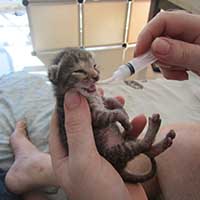
They also have the freedom to take a break in between assignments if they like, to travel or pursue other interests. Having resident pets make that freedom a bit more complicated. These two have also made fostering a family affair; Aisha’s mom, Moya, has been approved and currently is waiting to receive Napoli, an 8 day old kitten who literally could not survive without the help of fosters. As Aisha says: “we need kittens in our life”!
Fostering Can Boost Your Own Mental Health What Aisha may not know, is that scientifically, she is 100% correct about needing animals in her life. According to Reader’s Digest, it has been proven in scientific studies that people who have animals in their life are less lonely, have less chance of developing heart disease, have reduced levels of the stress hormone cortisol and increased levels of a “happy” hormone called oxytocin in their bloodstreams. Additionally, studies that show that people take better care of themselves, children develop fewer allergies, and older adults have better brain function when there are animals in their house to interact with. This benefits can literally be a lifesaver for folks without their own permanent pets.

What if you already have pets? Could your family and a rescued animal in need still benefit from fostering? To answer this question, I spoke to Hannah, from Baldwin’s Guest House Like Aisha and Rory, Hannah also fosters dogs. However, she also has 2 dogs of her own: Taylor and Bonita, as well as several resident cats. During summertime, Hannah’s business requires her to be present on-site a great deal of the time, so she is able to handle the careful introduction of a foster to her resident animal crew. Conversely, she also must give a lot of time and attention to her guests, so she finds that adult dogs are best, since they generally need less supervision and training than puppies.
Come fall, Hannah has additional professional responsibilities that require her to be off-site more often. The flexibility of fostering allows her to take animals that have a defined start and end date coinciding with her availability. This type of temporary home was needed for a recent foster named Cuasi, who had been adopted by a foreigner and was awaiting a travel date. His adoptive mom flew back herself to escort him (another hidden benefit that can be realized from fostering is making new friends one might not have met otherwise-a bond is sometimes forged between the foster family and the adoptive family). Hannah has noticed that having fosters has brought out some of the best traits in her own dogs. Both Taylor and Bonita have clearly shown compassion, leadership, and generosity when interacting with a timid dog like Flan, one of her current fosters. Taylor and Bonita also clearly love Flan’s company. Flan and the other dogs being fostered all benefit by observing the resident dogs modeling how dogs are expected to behave in a house, in a yard, around a variety of people, around other dogs, and around cats.

Speaking of cats, this brings us to Charlie. Hannah is also currently fostering Charlie, who has a medical condition that requires 2 months of treatment. As Charlie has gotten comfortable at Baldwin’s Guest House, his personality becomes for evident every day. Remember those resident cats? Ya, Charlie is overly interested and excited by them, and gives them too much unwanted attention. Knowing this and other personality traits that only become evident as the animal settles into a home environment will help the animal be better matched to an adoptive family. And speaking of adoptive families, through Hannah’s network of friends, Charlie is going to an adoptive home in the United States when his treatment is complete. Good work, Hannah!
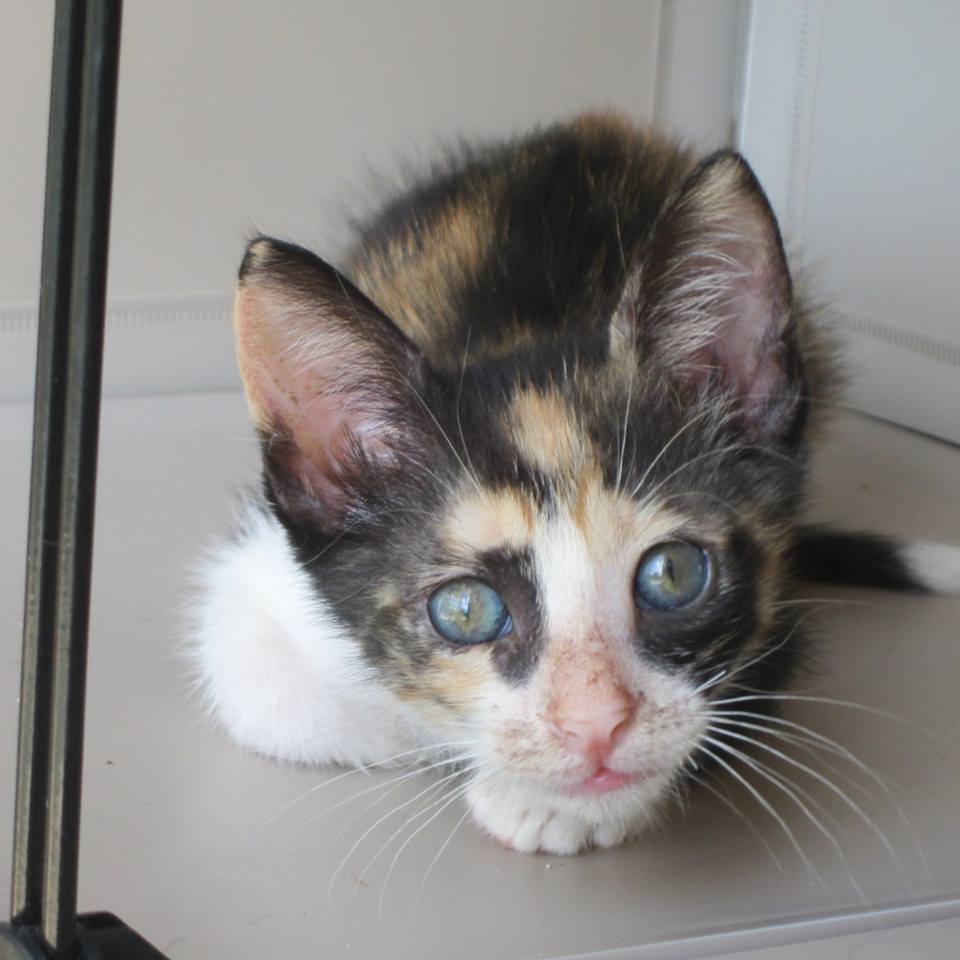
Our Own Foster Experience. Like Aisha, Rory and Hannah, Greg and I also foster. Unlike them, our living situation is only conducive to fostering kittens. From previous fostering experience, we have gained the skills necessary to care for neonate kittens (kittens under 2 weeks old) who no longer have their mother. These kittens cannot be cared for in a shelter environment for various reasons, and without a foster home, they would be destined to be humanely euthanized.
Napoli is one such kitten. He came to us at 6 days old, and this is our first week of fostering him. Kittens this age are nearly helpless, fragile and vulnerable; they can not see or even eat on their own and must be fed every 2-3 hours around the clock. We gain more skills from taking care of him, and he survives because of our care. Napoli has a regular foster waiting for him (Aisha’s mom, Moya!) as soon as he can eat on his own and use the litter box.

We also foster older kittens that must undergo various veterinary procedures and gain certain skills before being available for adoption. Often, these still young kittens also cannot be cared for in a shelter environment. We enjoy seeing the animals learn and grow, and are gratified knowing that we are the reason they have this chance. Two of our current fosters, brothers Cometa and Narcisco were semi-feral when they came to us at 6 weeks of age. On the same day, they were joined by Rocky and Holstein who were 4 and 8 weeks, respectively. Two weeks later, they have formed the cutest little troupe! The look of fear and shock in the tiny brothers’ eyes has been replaced by curiosity, wonder, and trust. Our resident grown cats provide daily examples of how to “cat”, and our kitty-loving Pitbull, Pachino, watches over the tiny one’s antics closely. He remains still and calm when the kittens get all puffed up as their play brings them close to him. He has won over many a frightened kitten, so he is patient, knowing these will be no different. Fostering has brought out the best versions of all of us in this household.
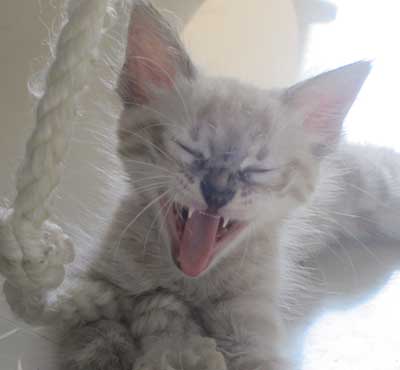
How You Can Help. Foster, Sponsor & Adopt. Thank you for making it this far! If you feel you might be interested in this program, here’s a few quick ways you can get involved, as well as contact information for the HSCI. If you can not physically foster, don’t worry! There are other ways you can participate in this program.
Requirements for Fostering. If you are considering fostering, in addition to having an appropriate space, time and skills to meet a particular animals’ needs, you will also need to have transportation and be committed to taking the animal to the HSCI for their vet appointments. Any resident animals will need to be brought up to date on their vaccinations and on flea and tick medicines. The HSCI pays for all medical care for the foster animal. Some fosters choose to pay for the animals’ litter and supplies. Be sure you openly and honestly communicate your situation to the HSCI, so that a good match can be made between you and a particular animal. Another important consideration is an emergency plan, just like you would have for any resident animals. What if you get sick, or unexpectedly need to leave town? The HSCI could be an option, but what if the emergency is a hurricane? They have an emergency plan for the animals at the shelter, as should the foster family for the animals in their care.

For example, Greg and I have determined that our location is appropriate to shelter in place for us and all the animals, yet we have a spot in a sturdy crate and/or a leash for each animal, just in case we are wrong and have to move location or secure the animals due to breached windows. We have 10 days worth of food, water, and supplies for each animal, as well as sanitation supplies, battery operated fans and headlamps, and extra batteries. Of course, we also have human supplies for 10 days so the caregivers will be taken care of as well. So there is another benefit of fostering; it made us think about what we would do in an emergency, and actually prepare for it!
So are you considering benefiting the shelter, the animals and your self by fostering? Great for you! The HSCI would love to talk to you. You can contact them at adoptions@humanecozumel.org. Tell them Laurie sent you!
Other Options to Help the Foster Program. Do you want to be a part of fostering but can’t open up your home at this time? Maybe you don’t live (or stay for extended periods) on the island? You can still be a hero to the animals by considering adopting eligible animals being fostered, and by donating to the program through HSCI’s website or paypal link. Be sure to put “foster program” in the message to let them know that you want to support the medical care, food, and supplies for animals entering the fostering program. Every dollar goes directly to the animals, may be tax deductible, and is stretched as far as possible. Please help if you can. The foster program needs you! Please share and encourage others to help, too. Links are below.
Donate: https://www.humanecozumel.org/cuentasparadonar?lang=en
Adopt/Foster: adoptions@humanecozumel.org
About the Author: Laurie Carter is an avid fan of artists, animal rescue & Cozumel
Adopción temporal de mascotas para la Sociedad Humanitaria de Cozumel. Una perspectiva general.

La mayoría de las personas que leen este artículo habrán oído hablar de la Sociedad Humanitaria de la Isla de Cozumel (HSCI, por su nombre en inglés). Muchos lectores incluso tendrán algún conocimiento (o experiencia de primera mano) de lo que hace esta entidad 50-c sin fines de lucro. Lo que tal vez desconozcan es que además de supervisar las necesidades de los animales individuales, en la actualidad la HSCI también es un refugio. De hecho, esta organización tiene muchos programas y actividades que se realizan durante todo el año. Todos están diseñados para ayudar específicamente a cumplir el objetivo de reducir la población animal y su sufrimiento en la Isla. Uno de los programas más importantes es el de adopción temporal en casa.
Para un vistazo detallado de lo que abarca el programa de adopción temporal de la HSCI, conoceremos a algunos de los empleados y voluntarios que lo hacen posible, y, a través de ellos, aprenderemos lo que es y por qué es tan importante la adopción temporal. Cubriremos los beneficios de lo que es el albergue, los animales y las familias de adopción temporal, así como quién es candidato para participar, cuáles son las responsabilidades y de qué manera pueden hacer su solicitud para adoptar temporalmente a un animal.
Por último, veremos con cualquier persona puede brindar apoyo al programa. Incluso si usted no puede adoptar físicamente al animal, aún puede ayudar a salvar una vida. Pónganse cómodos pues esta será una lectura larga, y esperamos sea agradable e informativa.

¿Qué es la adopción temporal de una mascota? La adopción temporal se define sencillamente como abrir su hogar y su corazón a una mascota sin hogar, teniendo como objetivo proporcionar cuidados a ese animal hasta que vaya a su hogar permanente. En ocasiones la familia adoptiva ayudará a la HSCI a encontrar ese hogar permanente; en otras el hogar permanente ya estará esperando, sin embargo, es posible que debido a las circunstancias sea necesario el apoyo adicional de un hogar de adopción temporal. Es posible que los animales que ya tienen un hogar permanente sean demasiado jóvenes para viajar; tal vez estén esperando quien los escolte en su viaje o que posiblemente aún necesiten someterse a esterilización obligatoria y otros tratamientos médicos antes de ser liberados para ir con su familia adoptiva. La adopción temporal durante este periodo intermedio ayuda a que la mascota se adapte al cambio de una vida en el refugio a la vida en familia, de esa manera la familia adoptiva recibe un compañero de hogar más adaptado y mejor.
Los beneficios de la adopción temporal para el albergue, para los animales y para las familias de adopción temporal. Para ayudarnos a entender algunos de estos beneficios la gerente del refugio de la HSCII, Laurie de la Font, explica cómo es que el programa de adopción temporal ayuda al albergue para que puedan ampliar su alcance y así ayudar a más animales y brindar una mejor calidad de cuidados a todos los animales que supervisan. Hay un límite físico en cuanto a la cantidad de animales que pueden ser alojados en el refugio. A menudo este limite de espacio se extiende tanto como es posible, y en poco tiempo recibimos una llamada sobre un animal en problemas o que otro animal ha sido hallado de la noche a la mañana, abandonado y atado a las puertas del refugio. Naturalmente el personal de la HSCI hace todo lo posible para hacer un espacio tanto para estos animales como para el siguiente animal que necesite ayuda.
Al reducir la cantidad de animales en el refugio (alojando a ciertos animales con familias de adopción temporal de confianza), aminora la tensión del personal, así como las horas de trabajo empleadas en el albergue. El albergue tiene un espacio físico limitado, y también hay un limite en el numero de animales que el personal actual puede atender. Independientemente de las horas de trabajo invertidas en los ciados médicos, también se requieren horas de trabajo para brindar los cuidados físicos como la alimentación, el baño, cepillado, caminar, acariciar, hacer ejercicio y entrenamiento de los animales.
Los voluntarios ayudan al personal del albergue de la HSCI con estas y muchas de sus tareas, pero a medida que crece el número de animales en el refugio es más difícil cubrir las necesidades diarias de cada animal. Colocar a un animal rescatado con una familia de adopción temporal permite que el albergue esté listo para el siguiente animal que requiera ayuda inmediata.
Los animales rescatados se benefician física y mentalmente con la adopción temporal. Laurie, la diligente gerente del albergue de la HSCI, afirma que no importa cuán bien dirigido esté un albergue y no importa cuan dedicado sea el personal y los voluntarios, el ambiente del albergue aún es estresante para muchos animales. El estrés puede causar problemas de conducta y la reducción del sistema inmunológico, lo que hace que los animales sean vulnerables a las enfermedades. Además de estos beneficios y a diferencia de su estancia en el albergue, la nueva mascota tiene la oportunidad de vivir la experiencia de lo que es la verdadera vida en casa. Estas experiencias sacan a relucir la verdadera personalidad del animal logrando formar su comportamiento futuro. Perros que quizás son súper tímidos y que son retirados del albergue, es posible que en el ambiente cómodo de familia afloren y se conviertan en bichos cariñosos y bobalicones. Los gatos silvestres pueden aprender a confiar en los humanos y ser compañeros adorables y juguetones. Los animales se vuelven más apropiados para la adopción ya que la familia de adopción temporal ayuda a brindar las experiencias y el entrenamiento que necesita el animal También, y lo que es importante, la exposición a posibles adoptantes puede aumentar en un ambiente de adopción temporal conforme la familia comparte sus experiencias (tanto personalmente como en los medios sociales) con su familia, amigos y la comunidad.
Ejemplos de beneficios de adopción temporal. Estas son algunas historias conmovedoras de varias familias de adopción temporal (incluyendo su servidora) y los animales bajo sus cuidados.
Aisha y Rory son una pareja joven que aún no tienen mascotas propias. Brindan adopción temporal a cachorritos, uno a la vez, y que de otra manera hubieran tenido que recorrer un camino difícil para encontrar sus hogares permanentes. Hasta ahora esta pareja a acogido cachorritos a quienes no les espera un hogar adoptivo. Esto requiere de esfuerzos adicionales pues es necesario promover a este nuevo y fantástico cachorro dentro de su círculo de amigos y en la comunidad en general, con frecuencia a través de los medios sociales, pues las visitas en el albergue ya no son una opción. Aisha y Rory han enfrentado este reto con determinación. Se ha encontrado un hogar para cada uno de los cachorritos que han tenido en adopción personal. Durante la búsqueda de un hogar permanente, cada animal ha recibido amor, atención y el entrenamiento que necesita para convertirse en una buena mascota del hogar. Aisha señala que una vez que han concluido con su labor y que el cachorro ha encontrado su hogar permanente, ella y Rory están dispuestos a recibir al próximo cachorro procedente de la HSCI. Ello les permite continuar disfrutando de los cachorros mientras tienen la satisfacción de ver que los cachorros a los que sociabilizan y entrenan van a un hogar cariñoso, Y también saber que han liberado un espacio físico para que otro animal sea aceptado en el albergue.
También, si lo desean, tienen la libertad de tomar un descanso de la labor entre cachorro y otro para viajar o realizar otras cosas de interés. Al tener mascotas permanentes hace que esa libertad sea algo más complicada. Esta pareja también ha hecho de la adopción temporal una cuestión familiar. La madre de Aisha, Moya, ha recibido la aprobación y está por recibir a Napoli, un gatito de 8 días de nacido quien literalmente no podría sobrevivir sin la ayuda de quienes le brindaron la adopción temporal. Como dice Aisha: “¡Necesitamos gatitos en nuestras vidas!”.
La adopción temporal puede estimular su propia salud mental. Lo que quizás Aisha desconozca es que científicamente ella esta 100% en lo correcto al decir que necesita animales en su vida. Según la revista Reader’s Digest, los estudios científicos han comprobado que las personas cuyas vidas incluyen animales, son menos propensas a desarrollar enfermedades cardiacas, sus niveles de la hormona productora de estrés, cortisol, disminuyen, y en la sangre aumentan los niveles de la hormona “feliz”, llamada oxitocina. Asimismo, los estudios muestran que las personas tienden a cuidar más de sí mismas, los chicos desarrollan menos alergias y las funciones cerebrales de los adultos mayores son mejores cuando interactúan con un animal en casa. Estos beneficios pueden literalmente convertirse en un salvavidas para personas que no tienen animales en forma permanente.

¿Qué sucede si usted ya tiene mascotas? ¿Aún así podrían su familia y el animal rescatado verse beneficiados? Para contestar esta pregunta platique con Hannah, de la Baldwin’s Guest House . Al igual que Aisha y Rory, Hannah se dedica a brindar hogar de adopción temporal a perros. Sin embargo, también tiene dos perros propios: Taylor y Bonita, así como varios gatos. Durante el verano el negocio de Hannah requiere que se encuentre presente en el mismo durante gran parte del tiempo por lo que le es posible presentar al animal de adopción temporal cuidadosamente a su equipo de animales. Por otro lado, también debe invertir mucho tiempo y atención a sus huéspedes por lo que encuentra que los perros adultos son los mejores ya que, por lo general, necesitan menor supervisión y atención que los cachorros.
Cuando llega el otoño, Hannah tiene responsabilidades profesionales adicionales que le requieren salir con mayor frecuencia del sitio. La flexibilidad de la adopción temporal le permite adoptar temporalmente a animales con una fecha definida de inicio y de finalización que coincidan con su disponibilidad. Un adoptado temporal llamado Cuasi, quien había sido adoptado por una persona extrajera, requirió este tipo de hogar temporal mientras esperaba la fecha para viajar. Su madre adoptiva voló personalmente para acompañarlo (otro de los beneficios ocultos que se pueden llevar a cabo con la adopción temporal es el de hacer nuevos amigos a quien un no hubiera conocido de otra manera; en ocasiones se crea un lazo entre la familia de adopción temporal y la familia que adopta). Hannah ha notado que al tener animales en adopción temporal ha sacado a relucir algunas de las mejores cualidades de sus propios perros. Tanto Taylor como Bonita claramente han demostrado compasión liderazgo y generosidad al interactuar con un perro tímido como Flan, uno de los actuales adoptados temporales. Es evidente que a Taylor y a Bonita también les encanta la compañía de Flan. Flan y los demás perros que han sido temporalmente adoptados se han beneficiado al ver el modelo de cómo se espera que un perro se comporte en casa, en un pario, alrededor de diversas personas, en torno a otros perros y de los gatos.

Hablando de gatos, esto nos lleva a Charlie. En la actualidad Hannah también está cuidando de Charlie, quien padece de una condición médica que requiere 2 meses de tratamiento. A medida que Charlie se ha sentido cómodo en la casa de huéspedes Baldwin, su personalidad se manifiesta más conforme pasan los días. ¿Recuerdan a los gatos residentes? Charlie está sumamente interesado en y emocionado con ellos, y les brinda demasiada atención no deseada. Sabiendo esto y otros rasgos de su personalidad que sólo son notorios conforme el animal se instala en un ambiente doméstico, ayudarán a que el animal se ajuste mejor a una familia adoptiva. Y, hablando de familias adoptivas, a través de la red de amigos de Hannah, una vez que Charlie concluya su tratamiento médico, irá a un hogar en los Estados Unidos. ¡Buen trabajo, Hannah!

Nuestra propia experiencia adoptando temporalmente. Al igual que Aisha, Rory y Hannah, Greg y yo adoptamos temporalmente. A diferencia de ellos, nuestra situación de visa sólo es propicia para adoptar gatitos temporalmente. Con base en una adopción temporal anterior, hemos adquirido los conocimientos necesarios para dar cuidados a gatitos neonatos (gatitos de menos de 2 semanas de nacidos) quienes ya no tienen a su madre. Debido a diversas razones ya no es posible cuidar de estos gatitos en un refugio, y al no tener un hogar de adopción temporal estarían destinados para sacrificarlos de manera compasiva.
Napoli es esa clase de gatito. Llegó a nosotros con tan solo 6 días de nacido y esta es nuestra primera semana de adopción temporal. Los gatitos de esta edad son casi indefensos, frágiles y vulnerables; no pueden ver o comer por sí mismos y deben ser alimentados cada 2 a 3 horas del día. Adquirimos más conocimientos al cuidarlo, y él sobrevive gracias a nuestros cuidados. A Napoli le espera una adopción normal (¡Moya, la madre de Aisha!) tan pronto y pueda comer por sí mismo y use la caja de arena.

También hemos adoptado temporalmente a gatitos de mayor edad quienes deben someterse a diversos procedimientos veterinarios y adquirir ciertas habilidades antes de ponerlos en adopción. Con frecuencia, estos gatitos que aún son jóvenes no pueden obtener cuidados en el albergue. Disfrutamos ver cómo los animales aprenden y crecen, y nos satisface saber que somos la razón por la cual tienen esta oportunidad. Dos de nuestros adoptados temporales en la actualidad, los hermanos Cometa y Narcisco, eran semi-salvajes cuando los recibimos a sus 6 semanas de edad. Ese mismo día se les unieron Rocky y Holstein quienes tenían 4 y 8 semanas de edad, respectivamente. Después de dos semanas, ¡han formado el grupo más lindo! La mirada de miedo y asombro en los ojos de los pequeños hermanos ha sido reemplazada por la curiosidad, el asombro y confianza. Nuestros gatos residentes diariamente ofrecen ejemplos de “como ser gato”, y Pachino, nuestro pitbull a quien le encantan los gatitos vigila las travesuras de los pequeños muy de cerca. Él permanece quiero y calmado cuando los gatitos se esponjan en tanto sus juegos los llevan cerca del él. Ha logrado conquistar a muchos gatitos temerosos; así que, tiene paciencia pues sabe que éstos no son distintos. La adopción temporal ha traído a flote la mejor versión de nosotros mismos en este hogar.
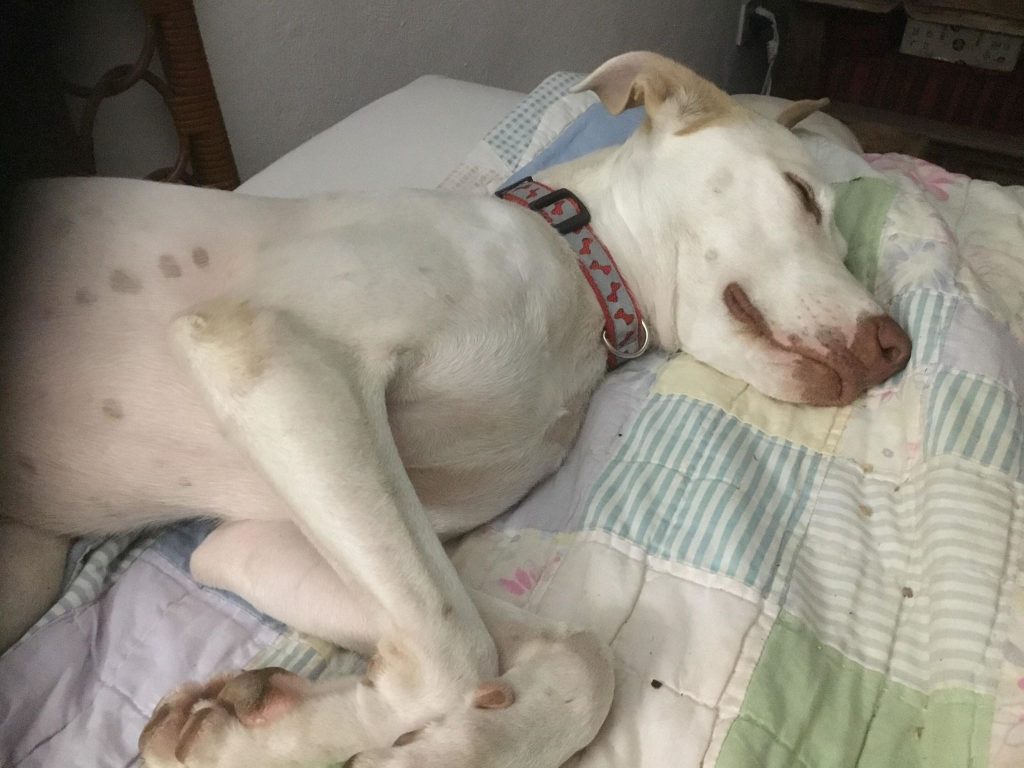
¿Cómo puede ayudar? Adopte temporalmente, patrocine y adopte. ¡Gracias por llegar hasta aquí! Si considera que le interesa este programa, aquí le exponemos algunos recursos rápidos sobre cómo participar y la información de contacto para la HSCI. En caso de que no le sea posible adoptar físicamente, ¡no se preocupe! Hay otras maneras por medio de las cuales puede participar en este programa.
Requisitos para adoptar temporalmente. Si está considerando adoptar temporalmente, además de contar con el espacio adecuado, tiempo y conocimientos para cubrir las necesidades de un animal en particular, también es necesario tener transporte y comprometerse a llevar al animal a la HSCI a sus citas con el veterinario. Es necesario que todo animal residente se encuentre al día en sus vacunas y medicamentos contra pulgas y garrapatas. La HSCI cubre todos los cuidados médicos para la mascota temporal. Algunas personas que adoptan temporalmente prefieren cubrir la camada y suministros de los animales. Asegúrese de comunicar abierta y honestamente su situación con la HSCI para que pueda hacerse una buena mancuerna entre usted y un animal particular. Otro punto importante para tomar en consideración es tener un plan de emergencia, al igual que lo haría con cualquier animal que resida de manera permanente. ¿Qué pasa si usted se enferma o si necesita salir inesperadamente de la ciudad? La HSCI puede ser una opción, pero ¿qué pasa si la emergencia es un huracán? La HSCI tiene un plan de emergencia para los animales del albergue, al igual que lo debe hacer la familia que adopta animales temporalmente para cuidarlos.

Por ejemplo, Greg y yo hemos decidido que donde estamos es un lugar adecuado para dar albergue tanto a nosotros como a todos los animales; no obstante, aún es necesario que creemos un cajón resistente y/o una correa para cada animal solo en caso de que nos equivoquemos y sea necesario movernos de lugar o asegurar a los animales debido a la ruptura de ventanas. Tenemos comida suficiente para 10 días, agua y suministros para cada animal, así como suministros sanitarios, ventiladores operados por baterías, linternas para la cabeza y baterías adicionales. Por supuesto que también contamos con suministros para 10 días para humanos, así que los cuidadores también recibirán cuidados. Así que la adopción temporal tiene otro beneficio; nos hizo pensar en lo que haríamos en caso de emergencia ¡y nos preparamos para ello!
Entonces, ¿está considerando beneficiar al refugio, a los animales y a usted mismo al adoptar temporalmente? ¡Bien por usted! A la HSCI le encantaría platicar con usted. Puede ponerse en contacto con ellos a través de adoptions@humanecozumel.org. ¡Digan que Laurie les envió!
Otras opciones para ayudar al programa de adopción temporal. ¿Desea formar parte de la adopción temporal pero no le es posible ofrecer su casa en este momento? ¿Quizá no vive (o no permanece por periodo prolongados) en la Isla? Aún así puede ser un héroe para los animales si considera adoptar animales que son candidatos y que se encuentran en adopción temporal, donando al programa a través del sitio web de la HSCI o del enlace en PayPal. Cada dólar se va directamente a los animales, puede ser deducible de impuestos y se estira lo más posible. Si le es posible, por favor ayude. ¿El programa de adopción temporal le necesita! Por favor comparta y anime que otros también ayuden. Los enlaces aparecen a continuación.
Donar: https://www.humanecozumel.org/cuentasparadonar
Adoptar: adoptions@humanecozumel.org
Sobre el Autor: Laurie Carter es una ávida fanática de los artistas, rescate de animales y Cozumel.
______________________________
Una ex yanqui de Connecticut quien llama hogar a Cozumel desde hace más de 15 años. Laura escapó al Caribe hace años, desplazándose de una isla a otra dando clases de BUCEO. Se dedicó a perder el tiempo en Jamaica y finalmente se detuvo en Cozumel para pasar unas vacaciones de 2 semanas que aún no terminan. Convenciendo a sus padres que pagaran una elegante universidad privada, obtuvo su título en Periodismo y Laura crea semanalmente Cozumel 4You, medios sociales y artículos promocionales sobre la Isla y también es moderadora en el grupo Cozumel 4 You en Facebook que actualmente cuenta con 25,000 miembros. Fabián, s umuy tolerante marido, desde hace mucho tiempo se resignó a no tener vida privada, pues se ha visto implicado en los diversos proyectos y planes que urde Laura. Son orgullosos padres de diversos perros y gatos rescatados. Mientras contempla su paso a través de la vida en el Caribe mexicano,Laura continúa siendo la pesadilla en la existencia de su muy tradicional suegra mexicana.
- Humane Society Cozumel Pet Week - March 28, 2025
- Cozumel Property Tax & Garbage Taxes - March 28, 2025
- Cozumel 4 You News March2025 - March 28, 2025
An ex-Connecticut Yankee who has called Cozumel home for over 18 years, Laura ran away to the Caribbean years ago, bumped around the islands teaching SCUBA diving, lost some time in Jamaica, and finally stopped in Cozumel for a 2 week vacation that hasn’t ended yet. With a degree in Journalism from a fancy private college she convinced her parents to pay for, Laura writes, edits, and creates the weekly Cozumel 4 You news, social media, and promotional articles about the island, as well as moderates the Cozumel 4 You Facebook group, which currently has over 25,000 members. Her long suffering husband, Fabian, has long since resigned himself to having zero private life, as he’s been involved in her various schemes and plots since his arrival. Proud parents to a variety of rescue dogs and cats, Laura continues to be the bane of her traditional Mexican mother-in-law’s existence, as she muses her way through life in the Mexican Caribbean. ______________________________ Una ex yanqui de Connecticut quien llama hogar a Cozumel desde hace más de 15 años. Laura escapó al Caribe hace años, desplazándose de una isla a otra dando clases de BUCEO. Se dedicó a perder el tiempo en Jamaica y finalmente se detuvo en Cozumel para pasar unas vacaciones de 2 semanas que aún no terminan. Convenciendo a sus padres que pagaran una elegante universidad privada, obtuvo su título en Periodismo y Laura crea semanalmente Cozumel 4You, medios sociales y artículos promocionales sobre la Isla y también es moderadora en el grupo Cozumel 4 You en Facebook que actualmente cuenta con 25,000 miembros. Fabián, s umuy tolerante marido, desde hace mucho tiempo se resignó a no tener vida privada, pues se ha visto implicado en los diversos proyectos y planes que urde Laura. Son orgullosos padres de diversos perros y gatos rescatados. Mientras contempla su paso a través de la vida en el Caribe mexicano, Laura continúa siendo la pesadilla en la existencia de su muy tradicional suegra mexicana.
Humane Society Cozumel Pet Week
Humane Society Cozumel Pet Week Humane Society of Cozumel Island “Pet...
Cozumel IMSS Hospital 5 Hectares Expansion
Cozumel IMSS Hospital 5 Hectares Expansion Cozumel to Donate 5...
AA Cozumel2025
AA Cozumel 2025 AA English & Spanish Speaking Meetings in Cozumel 2025...
Happy Holidays from the Humane Society of Cozumel Island
Happy Holidays Humane Society Cozumel Island Happy Holidays from the Humane...









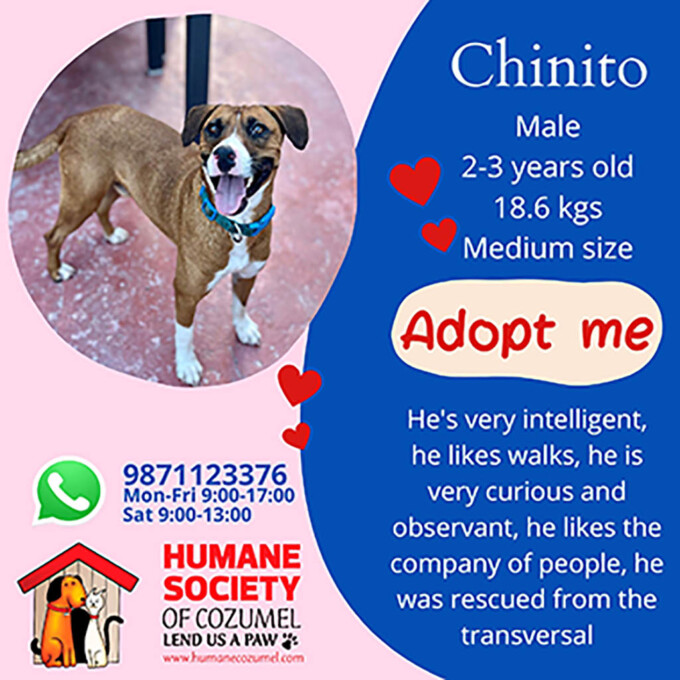









Leave a comment